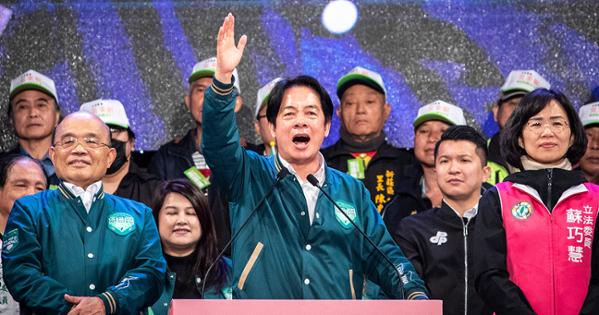American University
International
Three Questions on Taiwan’s Presidential Election

Governments and political observers closely watched January 13 as Taiwan, a country home to nearly 24 million people whose political status has long been disputed by China, held a high-stakes presidential election. Ruling party candidate Lai Ching-te, whom Beijing opposes, ultimately won the election. Ahead of Saturday’s vote, China called the election a choice between peace and war, and Lai’s nomination will play a role in the standing of relations with China for the next four years.
To better understand the implications of Taiwan’s presidential election, we asked Ambassador and SIS professor Piper Campbell to offer some insights.
- Governments around the world were closely watching Taiwan’s high-stakes election unfold this weekend. The Democratic Progressive Party candidate, Taiwan's current Vice President Lai Ching-te, declared victory Saturday night. What does this outcome mean for Taiwan and its relationship with China?
- The election of Lai Ching-te, who also uses the name William Lai, was a significant victory for the Democratic Progressive Party, which secured a historic, third, consecutive win. I've seen Lai called the 2.0 version of outgoing president Tsai Ing-wen, and Lai has been quite clear that he will continue Tsai's push for what is regularly described as de facto independence. This includes insisting on the right of the people of Taiwan to decide Taiwan's future and continuing to deepen unofficial relations with the United States and other democracies, with the goal of strengthening Taiwan's position vis-a-vis the People's Republic of China (PRC).
- Many analysts are predicting the PRC will continue, or even increase, its provocative military exercises, although the winter weather makes this more challenging in the short term. The PRC is in a bit of a corner: before the election, PRC officials warned there was a risk that Lai would “trigger cross-strait confrontation and conflict.” Furthermore, the PRC had already cut off important communications channels to reflect displeasure with Tsai Ing-wen, and they can't resume those with her successor without seeming to shift policy. One interesting note: the PRC's favored party, the Kuomintang (KMT), fared poorly at the presidential level but won the most parliamentary seats, depriving the DPP of a majority.
- This was Taiwan’s eighth democratic presidential election. With the outcome of this election in mind, what does the future of Taiwan’s democracy look like?
- I understand that on Saturday night, William Lai said his win was "a victory for the community of democracies." On X, U.S. Secretary of State Blinken posted that the election demonstrated the strength of Taiwan's democratic system. Beyond the PRC-Taiwan angle, this was a fascinating election. Don't forget: this was only Taiwan's eighth presidential contest, and by all reports, campaigning was fierce, and the population was highly engaged. And it wasn't only a two-party competition. One of the most interesting aspects was the strong showing of the (new) Taiwan People's Party, which reportedly was particularly popular with younger citizens.
- Diplomatically, the US recognizes a “One China” policy, though President Joe Biden has said repeatedly that the US would come to Taiwan’s aid in the event of a military confrontation with China. Chinese President Xi Jinping has discussed his desire for a “peaceful reunification” of Taiwan with China but has laid out conditions in which force could be used, according to Reuters. Given this existing tension, what do the results of this election mean for US-China relations?
- While we were celebrating MLK day on Monday, an unofficial bipartisan US delegation was meeting in Taiwan with President Tsai and President-elect Lai, who will take office in May. Former National Security Coordinator Stephen Hadley described the US commitment to Taiwan as "rock solid.” Everything I've seen and heard reflects that tone. Furthermore, Lai will have strong support from his incoming Vice President, Hsiao Bi-Khim, who previously served in Washington.